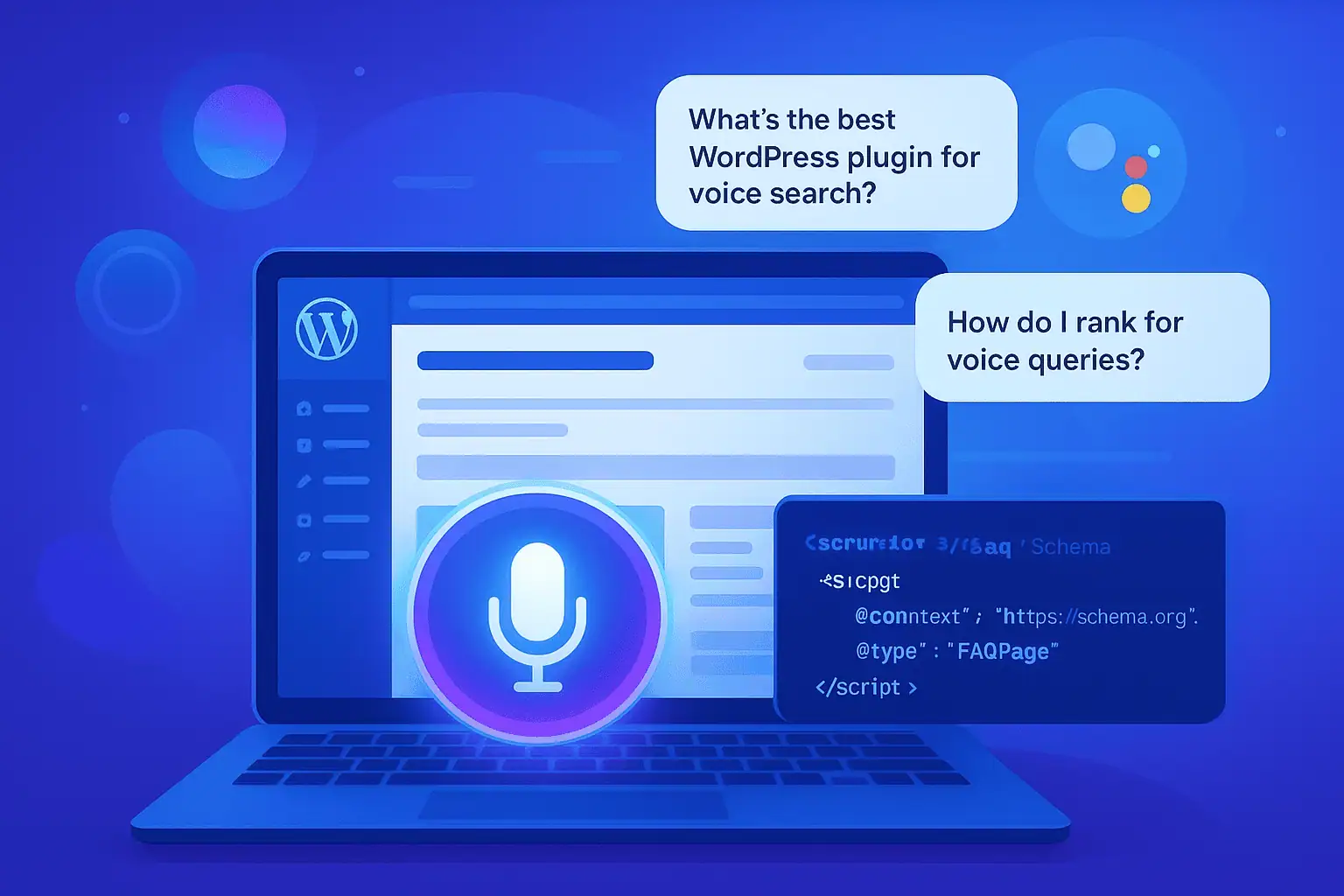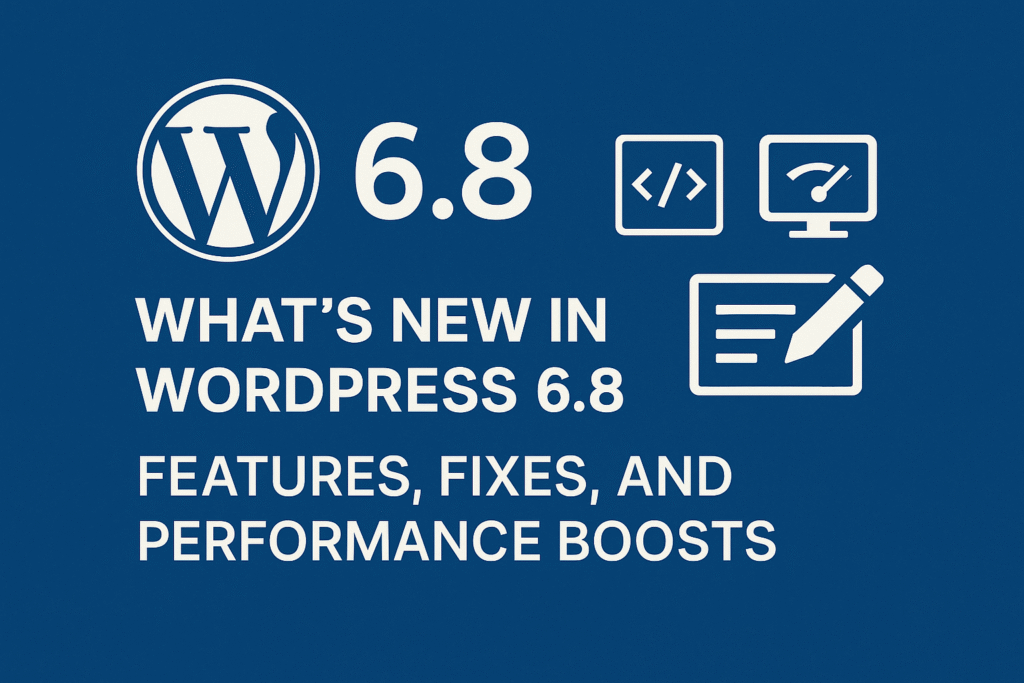
Table of Contents
Introduction to Voice Search Optimization for WordPress
In a world where mobile voice assistants like Siri, Google Assistant, and Alexa shape daily digital interactions, voice search optimization for WordPress has redefined how users engage with online content. By 2025, over 50% of all searches are driven by spoken search phrases, fueled by the widespread adoption of smart devices and advancements in AI technology.
For WordPress site owners, embracing conversational SEO strategies 2025 is critical to remain competitive. This guide explores actionable techniques for voice search optimization for WordPress, including voice-friendly content writing, implementing FAQ schema markup WordPress, and leveraging Rank Math voice search integration to boost visibility and engagement.
Unlike traditional text searches, voice search prioritizes natural language queries, with users asking full questions like “How can I optimize my WordPress site for voice search in 2025?” This shift requires conversational tone content tailored to voice search user intent. With WordPress powering over 40% of websites, its robust ecosystem of WordPress plugins for SEO and customizable themes makes it perfect for adapting to these trends.
Why focus on voice search optimization for WordPress now? Data reveals that voice searches drive immediate actions, such as local purchases or quick answers, increasing conversion rates by up to 20% for optimized sites. In 2025, advancements in Siri and Google Assistant optimization mean unoptimized sites risk losing significant traffic. Benefits include better rankings in featured snippets, enhanced accessibility, and stronger engagement through local voice search tips.
This article will cover essential strategies, from incorporating long-tail keywords for voice to utilizing structured data for voice results, ensuring your WordPress site is mobile-responsive and SEO-ready. We’ll include tables and charts to highlight trends and comparisons, maintaining natural keyword density for voice search optimization for WordPress throughout.
Understanding Voice Search Optimization for WordPress in 2025
Voice search optimization for WordPress is reshaping how users interact with content through spoken search phrases processed by devices using natural language queries. By August 2025, over 8 billion mobile voice assistants, such as Siri and Alexa, are active globally, doubling from 4 billion in 2020, underscoring the rapid rise of this technology.
Unlike traditional text searches, voice queries are inherently conversational, often beginning with question words like who, what, where, when, why, or how, and averaging 29 words compared to 3-4 for typed searches. This conversational tone content aligns with voice search user intent, incorporating context like location or prior interactions, making it essential for WordPress sites to adapt.
Key stats for 2025 highlight the stakes: voice commerce is expected to reach $40 billion, with 75% of households using smart speakers. Mobile voice assistants like Siri handle 1 billion queries weekly, amplifying the importance of Siri and Google Assistant optimization. For WordPress users, this means prioritizing conversational SEO strategies 2025 to capture this growing audience.
The SEO impact is significant—search engines now prioritize fast-loading, mobile-responsive sites enhanced with structured data for voice results and FAQ schema markup WordPress. Leveraging WordPress plugins for SEO, such as those enabling Rank Math voice search integration, helps sites stay competitive. Ignoring these trends risks losing traffic, especially for local voice search tips targeting “near me” queries. Long-tail keywords for voice further enhance visibility, ensuring WordPress sites meet the demands of voice-driven searches.
To visualize growth:
| Year | Voice Search Share (%) | Global Voice Assistants (Billions) |
|---|---|---|
| 2020 | 20 | 4 |
| 2023 | 40 | 6 |
| 2025 | 55 | 8 |
Why Voice Search Matters in 2025
The Rise of Voice Search in the Digital Era
Voice search optimization for WordPress has become one of the most important trends shaping SEO in 2025. With the explosive growth of smart speakers like Amazon Echo and Google Nest, along with mobile voice assistants such as Siri and Google Assistant, more users are relying on spoken search phrases instead of typing. Since voice queries are usually 3.7x faster than text searches, this shift highlights the need for websites to adapt to conversational and natural language queries.
Impact on Local SEO and User Intent
One of the biggest advantages of voice search lies in local SEO. Studies reveal that 58% of consumers use voice search to find local business information, such as “best plumber near me” or “coffee shop open now.” By incorporating local voice search tips and optimizing for voice search user intent, businesses can capture high-intent leads from nearby customers who are ready to take action.
Featured Snippets and Structured Data for Voice Results
Most voice answers come directly from featured snippets and rich answers, making structured data for voice results more important than ever. Adding FAQ Schema Markup in WordPress ensures your content is eligible for these zero-click answers. This not only improves visibility in search engines but also makes your site more likely to be chosen as the default spoken response by voice assistants.
Conversational SEO Strategies for 2025
Unlike traditional keyword stuffing, conversational SEO strategies 2025 focus on aligning with how people naturally speak. That means using long-tail keywords for voice, creating content in a conversational tone, and answering questions directly. Instead of targeting “best SEO plugin WordPress,” a voice-friendly version would be “What is the best SEO plugin for WordPress in 2025?” This approach ensures your site matches the natural language queries people actually ask.
How WordPress Plugins Help with Voice Search Optimization
Thankfully, WordPress makes it easy to optimize for voice search. Tools like Rank Math voice search integration and other WordPress plugins for SEO allow you to add schema, optimize for long-tail voice queries, and analyze content readability. With these tools, you can ensure your site is not only search-friendly but also voice-friendly.
Final Thoughts: Don’t Miss the Voice Search Wave
If your website isn’t optimized for voice search, you risk missing out on significant traffic and conversions. By combining voice-friendly content writing, schema markup, and plugins like Rank Math, you’ll be better prepared to dominate voice results in 2025 and beyond.
How Voice Search Is Different from Traditional Search
Before diving into advanced voice search optimization for WordPress, it’s important to understand how voice queries differ from traditional searches. When users type into Google, they often use short, keyword-focused phrases like “best pizza NYC.” But with mobile voice assistants such as Siri and Google Assistant, searches become longer and more natural, resembling real conversations. For example, a user might say, “What’s the best pizza place near me?”
This shift toward natural language queries means content must be tailored to spoken search phrases rather than just typed keywords. While traditional search results display a list of links, voice search results are more direct—delivered through featured snippets, structured data for voice results, and rich answers. Instead of scrolling through a webpage, the user simply hears the most relevant response read aloud by their voice assistant.
Here’s a quick comparison:
How Voice Search Differs from Traditional Search
Optimized for natural language queries, spoken search phrases, and structured data for voice results.
| Traditional Search | Voice Search |
|---|---|
| Keywords like “best pizza NYC” | Questions like “What’s the best pizza place near me?” |
| Short, typed queries | Long, conversational queries |
| Results: Multiple links | Results: Direct answers, FAQ snippets |
| User reads text | Voice assistant speaks the answer |
🔍 How to Optimize Your WordPress Site for Voice Search SEO (2025 Guide)
Voice Search Optimization for WordPress is no longer optional—it’s essential. With the rise of mobile voice assistants like Siri, Alexa, and Google Assistant, businesses must adapt their content strategy to match spoken search phrases and conversational SEO strategies 2025. Below are practical steps to ensure your WordPress site is fully optimized for this new era of search.
✅ 1. Use Conversational, Question-Based Content
Why it matters:
Unlike traditional SEO, voice search thrives on natural language queries. Users no longer type “best pizza NYC”—they ask, “What’s the best pizza place near me?”
What to do:
- Practice Voice-Friendly Content Writing by creating blog posts in a conversational tone.
- Use long-tail keywords for voice and focus on user intent.
- Frame sections with question-based headers: “What is…?”, “How do I…?”, “Why does…?”
- Research voice-style queries with tools like AnswerThePublic or AlsoAsked.
Voice SEO Writing Tip:
For voice assistants to read your answers, keep them short, clear, and under 50 words.
✅ 2. Add FAQ Schema to Pages and Posts
Why it matters:
When it comes to FAQ Schema Markup in WordPress, search engines love structured content. Voice assistants often pull their answers directly from FAQs because they’re concise and formatted.
How to do it in WordPress:
- Install Rank Math SEO plugin.
- Open your post → add the built-in FAQ block.
- Enter question + answer pairs based on voice search user intent.
- Rank Math automatically adds the proper schema.
Pro Tip: Always include an FAQ section at the end of posts with voice-friendly queries like “How do I install a WordPress plugin?” or “What’s the best SEO plugin for WordPress in 2025?”.
✅ 3. Optimize for Featured Snippets
Why it matters:
Featured snippets are the #1 source for voice search answers. If you want Siri or Google Assistant to speak your content, you need to target them.
Steps:
- Use question headers (H2, H3) that match spoken search phrases.
- Give direct answers in short paragraphs.
- Use bullet points or numbered lists for clarity.
- Analyze snippet opportunities with Ahrefs, SEMrush, or Rank Math.
✅ 4. Use Rank Math for Voice Search SEO
Why it matters:
Rank Math Voice Search Integration makes it easier to optimize content for voice assistants.
Key Features for Voice SEO:
- Built-in FAQ Schema & HowTo Schema.
- Keyword analysis for natural, spoken queries.
- Readability checker for conversational tone content.
- Structured data for voice results with one click.
How to use:
- Install → Configure → Apply schema to your posts.
- Use Rank Math’s SEO checklist to ensure your content meets voice-friendly standards.
✅ 5. Optimize for Local Voice Search
Why it matters:
Over 58% of voice searches are local. Queries like “Is there a coffee shop open near me?” dominate mobile voice assistants.
How to optimize:
- Keep your Google Business Profile updated.
- Add location-based landing pages.
- Use terms like “near me”, city names, and spoken phrases.
Local Voice Search Tip: Always include business hours, directions, and contact info clearly.
✅ 6. Make Your Site Mobile-First & Fast
Why it matters:
Most voice searches happen on smartphones. A slow or unresponsive WordPress site means lost rankings and frustrated users.
Optimization Tips:
- Use lightweight themes like Astra or GeneratePress.
- Install caching plugins (WP Rocket, LiteSpeed).
- Compress images with ShortPixel or Smush.
- Test with Google’s Mobile-Friendly Test & PageSpeed Insights.
✅ 7. Improve Site Accessibility & UX
Why it matters:
Voice SEO is linked to accessibility. If your site is easy to navigate, voice assistants will prioritize it.
Best practices:
- Use clear heading structures (H1, H2, H3).
- Avoid jargon—keep content simple and conversational.
- Use large fonts, clear CTAs, and alt text for all images.
- Rank Math can flag missing alt tags automatically.
✅ 8. Target Voice Search Keywords
Why it matters:
Not all keywords work for voice. You need long-tail, intent-based queries.
Examples:
- “How do I install a WordPress plugin?”
- “What’s the best SEO plugin for WordPress in 2025?”
- “Can I use WordPress for an online store?”
Tools to find voice keywords:
- Google Search Console (check queries → questions).
- Ubersuggest, SEMrush, Ahrefs.
- Rank Math Content AI module for voice-focused suggestions.
✅ 9. Use Structured Data Beyond FAQ
Why it matters:
Structured data boosts visibility in voice results. Don’t limit yourself to FAQ Schema.
Other useful schema types:
- HowTo Schema for step-by-step tutorials.
- Breadcrumb Schema for better navigation.
- Product Schema for WooCommerce stores.
- Article Schema for blog posts.
Pro Tip: Rank Math can automatically apply these with minimal setup.
👉 With these strategies, your WordPress site won’t just be voice-ready—it will dominate voice search optimization in 2025.
Voice Search Optimization Checklist
✅ Voice Search Optimization Checklist for WordPress (2025)
Follow this step-by-step checklist to optimize your WordPress site for voice search with Siri, Google Assistant, and Alexa.
- ✅ Use long-tail, natural language queries and spoken search phrases.
- ✅ Write voice-friendly content in a conversational tone.
- ✅ Create short, direct answers (40–50 words) under each question heading.
- ✅ Add FAQ Schema Markup in WordPress with Rank Math.
- ✅ Use HowTo schema for tutorials and step-by-step guides.
- ✅ Target featured snippets with clear H2/H3 question headers.
- ✅ Implement structured data for voice results (Product, Local Business, etc.).
- ✅ Ensure mobile-first, fast-loading design with caching & compression.
- ✅ Optimize Core Web Vitals for better performance.
- ✅ Improve site accessibility with clear headings & alt text.
- ✅ Keep Google Business Profile updated (hours, address, contact).
- ✅ Use location-based keywords like “near me” or city names.
- ✅ Create local landing pages optimized for voice search intent.
- ✅ Use Rank Math’s FAQ blocks, schema generator, and AI suggestions.
- ✅ Analyze long-tail voice keywords and conversational SEO strategies.
👉 Pro Tip: Write content as if you’re answering a friend’s question out loud — that’s the key to Conversational SEO Strategies 2025.
Targeting Long-Tail Keywords for Voice Search
Long-tail keywords for voice are phrases with three or more words, mirroring spoken search phrases. In voice search SEO WordPress, they capture specific intent, reducing competition and increasing relevance.
Why they matter: Voice queries are 76% longer than text, often questions like “How do I implement FAQ schema markup in WordPress?” Targeting these boosts chances of appearing in voice results.
Research tips: Use tools like Google Keyword Planner or Ahrefs to find natural language queries. Focus on question-based terms with low competition but high intent.
Implementation in WordPress: Integrate long-tail keywords naturally in titles, headings, and content. For example, instead of “WordPress SEO,” use “voice search SEO WordPress tips for beginners in 2025.”
Examples table:
| Short Keyword | Long-Tail for Voice | Monthly Searches (Est.) | Competition Level |
|---|---|---|---|
| WordPress SEO | Voice search SEO WordPress 2025 | 5,000 | Low |
| FAQ Schema | FAQ schema markup WordPress tutorial | 2,500 | Medium |
| Rank Math | Rank Math voice search integration | 1,800 | Low |
Optimize meta descriptions and alt text with these for better Siri and Google Assistant optimization.
Best practices: Aim for 1-2% density, avoid stuffing. Combine with conversational tone content for authenticity.
Case study: A blog targeting “long-tail keywords for voice” saw 30% traffic increase after optimization.
Writing Voice-Friendly Content for WordPress
Voice-friendly content writing involves creating readable, conversational text that answers queries directly. For voice search SEO WordPress, this means using a natural tone as if speaking to the user.
Core principles: Write in second person (“you”), keep sentences short (under 20 words), and use transitional phrases. Focus on voice search user intent by anticipating questions.
Steps to create:
- Identify spoken search phrases via tools like AnswerThePublic.
- Structure content with headings and bullet points for scannability.
- Incorporate natural language queries in intros and conclusions.
In WordPress, use the block editor for FAQ sections or lists. Plugins like Yoast help analyze readability.
Benefits: Content optimized this way ranks higher in featured snippets, crucial for voice results.
Challenges: Avoid jargon; test by reading aloud. For mobile voice assistants, ensure content loads quickly.
Example: Instead of “Optimization techniques,” write “Here’s how you can optimize your site for voice search in 2025.”
Density tip: Weave in LSI like “conversational tone content” naturally.
Chart idea: Readability scores before/after optimization (use a table for visualization).
| Content Type | Avg. Sentence Length | Flesch Reading Ease Score |
|---|---|---|
| Standard Blog | 25 words | 50 |
| Voice-Friendly | 15 words | 70 |
Higher scores improve voice compatibility.
Implementing FAQ Schema Markup in WordPress
FAQ schema markup WordPress enhances visibility by structuring Q&A content for search engines. It’s vital for voice search SEO WordPress as it helps assistants pull direct answers.
What is it? JSON-LD code that marks FAQs, making them eligible for rich results.
Steps in WordPress:
- Install a plugin like Rank Math or Schema Pro.
- Add FAQ blocks in posts/pages.
- Generate schema automatically.
Manual method: Use Google’s Structured Data Markup Helper, then insert via custom HTML.
For voice: FAQs target question-based queries, increasing chances in Siri and Google Assistant optimization.
Table of plugins:
| Plugin | Features for FAQ Schema | Price | Voice Search Benefit |
|---|---|---|---|
| Rank Math | Auto-markup, easy integration | Free/Pro | High |
| Yoast SEO | Basic schema support | Free/Pro | Medium |
| Schema Pro | Advanced FAQ options | Paid | High |
Pro Tip: Limit to 5-10 FAQs per page for optimal loading.
Key Takeaways for Voice Search Optimization for WordPress
Enhance with WordPress Plugins for SEO: Use plugins like Yoast, AIOSEO, or WP Rocket alongside Rank Math to ensure mobile-responsiveness and fast loading, critical for mobile voice assistants and overall SEO performance.
Prioritize Voice Search Optimization for WordPress: With over 50% of searches being voice-driven in 2025, optimizing your WordPress site for spoken search phrases is crucial to stay competitive and capture traffic from mobile voice assistants like Siri and Google Assistant.
Craft Voice-Friendly Content Writing: Create conversational tone content that mirrors natural language queries, using short sentences and question-based formats to align with voice search user intent, boosting engagement and featured snippet rankings.
Leverage FAQ Schema Markup WordPress: Implement FAQ schema using plugins like Rank Math or Schema Pro to structure content for voice results, enhancing visibility for Siri and Google Assistant optimization and increasing click-through rates.
Utilize Rank Math Voice Search Integration: Harness Rank Math’s advanced features, like auto-markup and AI-driven suggestions, to optimize for long-tail keywords for voice and structured data for voice results, ensuring seamless adaptation to conversational SEO strategies 2025.
Focus on Conversational SEO Strategies 2025: Adapt to AI-driven trends by targeting long-tail keywords for voice and incorporating local voice search tips, such as “near me” queries, to drive local engagement and conversions.
Frequently Asked Questions on Voice Search Optimization for WordPress
Explore common People Also Ask (PAA) questions about voice search optimization for WordPress, including tips on voice-friendly content writing, FAQ schema markup WordPress, and more to enhance your site’s performance in 2025.
What is voice search optimization for WordPress?
How can I implement voice-friendly content writing?
What is FAQ schema markup in WordPress?
How does Rank Math voice search integration help?
What are conversational SEO strategies for 2025?
How to use natural language queries in optimization?
What are spoken search phrases and their importance?
How to optimize for mobile voice assistants?
What are tips for Siri and Google Assistant optimization?
Why use long-tail keywords for voice search?
How to add structured data for voice results?
What are the best WordPress plugins for SEO in voice search?
How to understand voice search user intent?
How to write conversational tone content?
What are local voice search tips for WordPress?
These FAQs address key People Also Ask queries to help you master voice search optimization for WordPress. Implement these strategies today for better visibility in 2025.
Conclusion: Future-Proof Your WordPress Site with Voice Search Optimization
In the rapidly evolving digital landscape of 2025, voice search optimization for WordPress is a game-changer for website owners aiming to stay ahead. With over 50% of global searches now driven by spoken search phrases, leveraging voice-friendly content writing, FAQ schema markup WordPress, and Rank Math voice search integration is essential to capture the growing audience using mobile voice assistants like Siri and Google Assistant. By aligning your content with voice search user intent and incorporating conversational SEO strategies 2025, your WordPress site can secure higher rankings in featured snippets, drive up to 20% higher conversion rates, and enhance user engagement through natural language queries.
Implementing structured data for voice results and optimizing for long-tail keywords for voice ensures your site resonates with the conversational tone content users expect. Tools like Rank Math and other WordPress plugins for SEO streamline this process, making it easier to adapt to AI-driven trends and local voice search tips, such as “near me” queries that dominate local markets. Neglecting these strategies risks losing significant traffic to competitors who prioritize Siri and Google Assistant optimization.
The future of search is voice, and 2025 is the year to act. Start by auditing your site for mobile-responsiveness, integrating FAQ schema, and crafting content that speaks directly to your audience’s queries. With the right approach, your WordPress site will not only attract more visitors but also build lasting connections in an increasingly voice-driven world. Embrace voice search optimization for WordPress today to unlock its full potential and lead the way in SEO innovation..
Ready to Optimize Your Site?
Need help implementing voice SEO on your WordPress site?
👉 Hire a WordPress SEO Expert
👉 Download Rank Math Plugin
👉 Read Our Full SEO for WordPress Guide
🚀 Launch Your Online Dreams with Hostinger!
The information provided on this website is for general informational purposes only. While we strive to keep the content accurate and up-to-date, we make no guarantees of any kind about the completeness, reliability, or suitability of the information. Any action you take based on the information on this website is strictly at your own risk.
💲 Affiliate Disclosure:Some of the links in this post may be affiliate links. This means we may earn a small commission if you click on the link and make a purchase, at no additional cost to you. This helps support our work and allows us to continue providing quality content. We only recommend products or services we believe will add value to our readers.
✨ Connect with Us ✨
Stay updated with our latest WordPress guides, SEO tips, and AI tools. Follow us on social media or reach out via email!
You May Also Like:
Explore more powerful insights to level up your WordPress and SEO game:
💡 Keep exploring insightful tips and strategies at WordPressGuruPro.com


